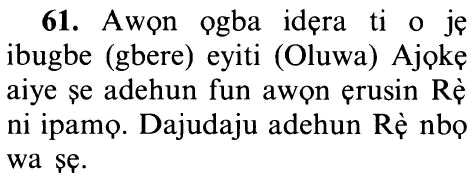19vs61
Select any filter and click on Go! to see results
جَنَّاتِ عَدْنٍ الَّتِي وَعَدَ الرَّحْمَنُ عِبَادَهُ بِالْغَيْبِ إِنَّهُ كَانَ وَعْدُهُ مَأْتِيّاً
Jannati AAadnin allatee waAAada alrrahmanu AAibadahu bialghaybi innahu kana waAAduhu matiyyan
Index Terms
Click to play
Yoruba Translation

Hausa Translation
Gidãjen Aljannar zama wadda Mai rahama ya yi alkawarin bãyarwa ga bãyinSa (mãsu aikin ĩmãni) a fake. Lalle ne shĩ, alkawarin ya kasance abin riskuwa.
Asbabu n-Nuzuul (Occasions of Revelation)
The Description of the Gardens of the Truthful and Those Who repent
Allah, the Exalted, says;
جَنَّاتِ عَدْنٍ الَّتِي وَعَدَ الرَّحْمَنُ عِبَادَهُ بِالْغَيْبِ ...
They will enter `Adn Gardens which the Most Gracious has promised to His servants in the unseen.
Allah, the Exalted, says that the Gardens (of Paradise), which the penitent will enter, will be Gardens of `Adn, meaning, eternity.
These are Gardens that the Most Beneficent promises His servants in the unseen.
This means that these Gardens are from the unseen things that they believe in, even though they have never witnessed them. They believe in the unseen out of their strong conviction and the strength of their faith.
Concerning Allah's statement,
... إِنَّهُ كَانَ وَعْدُهُ مَأْتِيًّا ﴿٦١﴾
Verily, His promise must come to pass.
This affirms the fact that this will occur, and that it is a settled matter. Allah does not break His promise, nor does He change it.
This is similar to His statement,
كَانَ وَعْدُهُ مَفْعُولاً
His promise is certainly to be accomplished. (73:18)
This means that His promise will be and there is no avoiding it.
Allah's statement here, مَأْتِيًّا (must come to pass),
This means that it will come to His servants who are striving towards it and they will reach it.
There are those commentators who said, مَأْتِيًّا (must come to pass),
"This means it is coming, because everything that comes to you, you also come to it.
This is as the Arabs say, `Fifty years came to me, and I came to fifty years.' They both mean the same thing (I'm fifty years old).''
يقول تعالى الجنات التي يدخلها التائبون من ذنوبهم هي جنات عدن أي إقامة التي وعد الرحمن عباده بظهر الغيب أي هي من الغيب الذي يؤمنون به وما رأوه وذلك لشدة إيقانهم وقوة إيمانهم وقوله " إنه كان وعده مأتيا " تأكيد لحصول ذلك وثبوته واستقراره فإن الله لا يخلف الميعاد ولا يبدله كقوله " كان وعده مفعولا " أي كائنا لا محالة وقوله هاهنا " مأتيا " أي العباد صائرون إليه وسيأتونه ومنهم من قال " مأتيا " بمعنى آتيا لأن كل ما أتاك فقد أتيته كما تقول العرب : أتت علي خمسون سنة وأتيت على خمسين سنة كلاهما بمعنى واحد .
"جنات عدن" إقامة بدل من الجنة "التي وعد الرحمن عباده بالغيب" أي غائبين عنها "إنه كان وعده" أي موعوده "مأتيا" بمعنى آتيا وأصله مأتوي أو موعوده هنا الجنة يأتيه أهله
بدلا من الجنة فانتصبت قال أبو إسحاق الزجاج ويجوز " جنات عدن " على الابتداء قال أبو حاتم ولولا الخط لكان " جنة عدن " لأن قبله " يدخلون الجنة "
I'raab - grammatical analysis of the Qur'an
«جَنَّاتِ» بدل من الجنة في الآية السابقة منصوب بالكسرة لأنه جمع مؤنث سالم «عَدْنٍ» مضاف إليه «الَّتِي» اسم موصول صفة لجنات «وَعَدَ الرَّحْمنُ» ماض وفاعله والجملة صلة «عِبادَهُ» مفعول به والهاء مضاف إليه «بِالْغَيْبِ» متعلقان بمحذوف حال «إِنَّهُ» إن واسمها والجملة تعليلية «كانَ وَعْدُهُ مَأْتِيًّا» كان واسمها وخبرها والهاء في وعده مضاف إليه والجملة خبر إنه
